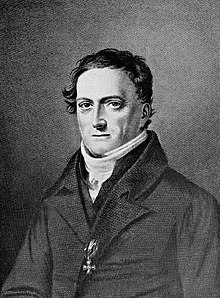This article includes a list of general references, but it lacks sufficient corresponding inline citations. (December 2011) |
Johann Friedrich Herbart | |
|---|---|
 Engraving by Conrad Geyer | |
| Born | 4 May 1776 |
| Died | 14 August 1841 (aged 65) |
| Alma mater | University of Jena |
| Era | 19th-century philosophy |
| Region | Western philosophy |
| School | German idealism Post-Kantianism[1] |
| Institutions | University of Göttingen University of Königsberg |
Main interests | Logic, metaphysics, epistemology, ethics, aesthetics |
Notable ideas | Pluralistic realism Pedagogy as an academic discipline |
Preview warning: Page using Template:Infobox philosopher with unknown parameter "influences"
Preview warning: Page using Template:Infobox philosopher with unknown parameter "influenced"
Johann Friedrich Herbart (German: [ˈhɛʁbaʁt]; 4 May 1776 – 14 August 1841) was a German philosopher, psychologist and founder of pedagogy as an academic discipline.
Herbart is now remembered amongst the post-Kantian philosophers mostly as making the greatest contrast to Hegel—in particular in relation to aesthetics. His educational philosophy is known as Herbartianism.
- ^ Jeremy Gray, Plato's Ghost: The Modernist Transformation of Mathematics, Princeton University Press, 2008, p. 83.